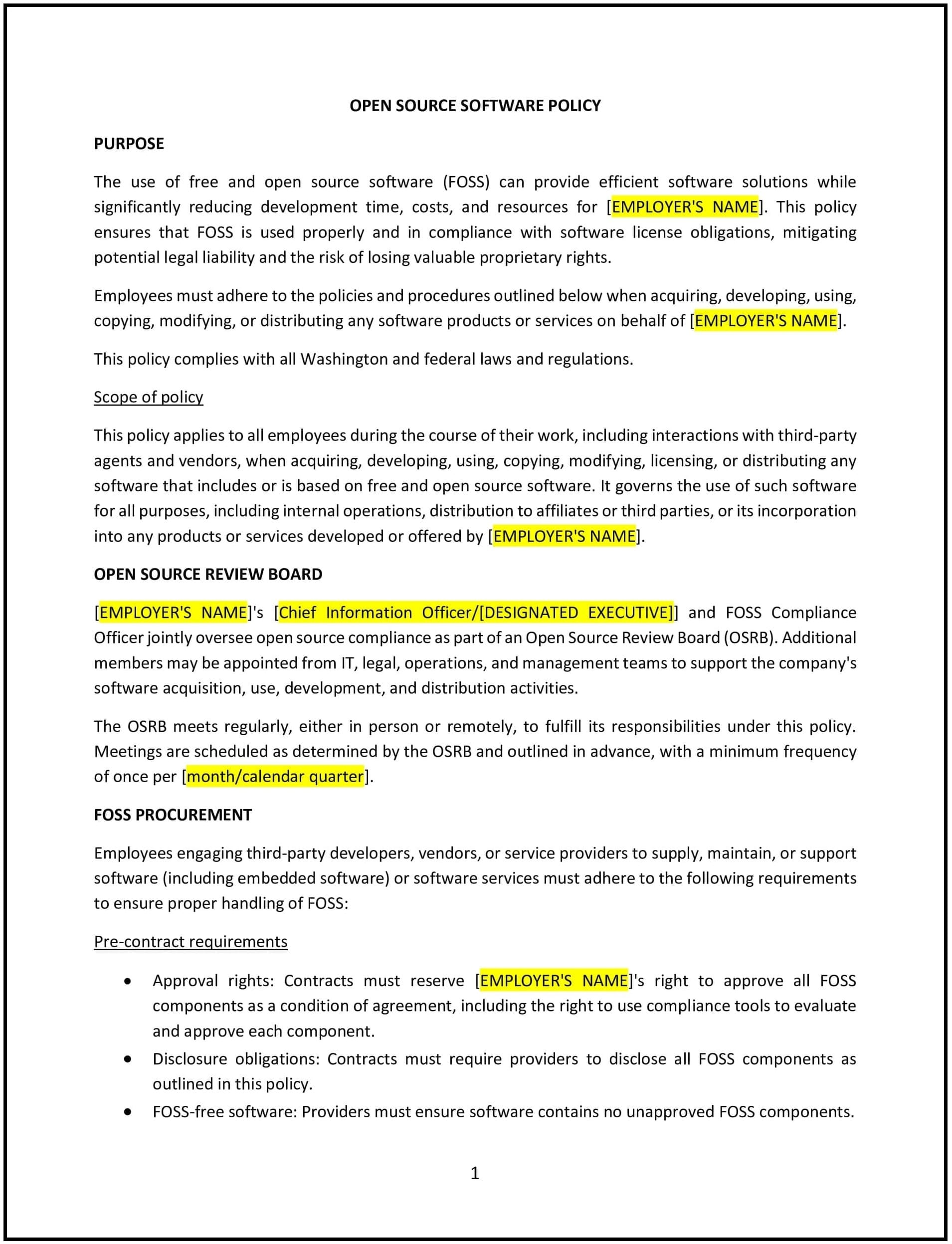Open source software policy (Washington): Free template
Got contracts to review? While you're here for policies, let Cobrief make contract review effortless—start your free review now.

Customize this template for free
This open source software policy is designed to help Washington businesses manage the use of open source software within the company. The policy outlines guidelines for evaluating, acquiring, and using open source software, enhancing compliance with relevant licenses and regulations. It provides a framework for ensuring that open source software is used responsibly and effectively while mitigating any potential legal or security risks associated with its use.
By adopting this policy, businesses can leverage open source software efficiently, reduce legal risks, and maintain compliance with Washington state laws and federal regulations related to software licensing and intellectual property.
How to use this open source software policy (Washington)
- Define open source software: The policy should provide a clear definition of open source software, outlining the distinction between open source and proprietary software. It should explain the concept of open source licenses and the specific permissions granted by the software’s license.
- Set guidelines for evaluating open source software: The policy should outline the process for evaluating open source software before adoption. This may include ensuring that the software is compatible with the business’s existing infrastructure, meets security standards, and complies with applicable licenses.
- Address licensing requirements: The policy should specify how employees must adhere to the terms of open source software licenses. This includes understanding and complying with the obligations of each license, such as attribution, modifications, and redistribution. The policy should also emphasize the importance of keeping track of the licenses for software used within the company.
- Ensure security measures: The policy should emphasize the importance of evaluating and maintaining the security of open source software. Employees should be instructed to assess the software for vulnerabilities, apply patches and updates promptly, and use trusted sources for downloading software.
- Establish procedures for contributing to open source projects: If the company contributes to open source projects, the policy should provide guidelines for managing contributions. This includes ensuring that contributions do not violate the company’s intellectual property rights or compromise proprietary software.
- Protect intellectual property rights: The policy should address how open source software interacts with the company’s proprietary software and intellectual property. Employees should be instructed not to incorporate proprietary code into open source projects unless explicitly permitted by the company’s licensing agreements.
- Ensure compliance with Washington and federal laws: The policy should ensure that the use of open source software complies with Washington state laws and federal regulations related to software licensing and intellectual property. It should address how the company will handle issues such as patent rights, trademarks, and copyright laws.
- Review and update regularly: Periodically review and update the policy to ensure it remains compliant with Washington state laws, federal regulations, and any changes in the company’s operations. Regular updates will help ensure the policy stays relevant and effective.
Benefits of using this open source software policy (Washington)
This policy offers several benefits for Washington businesses:
- Reduces legal risks: By improving compliance with open source software licenses, the policy helps businesses avoid legal disputes related to unauthorized use or redistribution of open source software.
- Improves software security: The policy emphasizes the importance of evaluating and maintaining the security of open source software, helping to reduce the risk of vulnerabilities and cyber threats that could affect the business.
- Promotes responsible software use: The policy provides clear guidelines for the responsible use and management of open source software, ensuring that employees understand their responsibilities and obligations under various software licenses.
- Enhances business efficiency: Open source software can be a cost-effective solution for businesses, and the policy helps businesses take advantage of open source software’s benefits while minimizing potential risks.
- Supports innovation and collaboration: By adopting a structured approach to open source software, the policy encourages collaboration with the broader open source community and supports innovation within the company.
- Protects intellectual property: The policy ensures that the company’s proprietary software and intellectual property rights are protected when using or contributing to open source projects.
Tips for using this open source software policy (Washington)
- Communicate the policy clearly: Ensure all employees are aware of the open source software policy and understand their responsibilities when using open source software. Include the policy in the employee handbook, review it during onboarding, and provide periodic reminders.
- Evaluate software before adoption: Before adopting open source software, ensure that it meets the company’s security, functionality, and licensing requirements. Use a standardized process to evaluate software and assess its compatibility with existing systems.
- Stay updated on licensing changes: Open source licenses can change over time, so it is important to stay updated on any changes to the licenses governing the software your business uses. Review software licenses periodically to ensure continued compliance.
- Provide training on open source licensing: Offer training for employees to help them understand the complexities of open source licenses and their obligations when using or contributing to open source software.
- Implement a tracking system for open source software: Use a centralized system to track the open source software used within the company, including the licenses associated with each piece of software. This helps ensure compliance and makes it easier to manage the software portfolio.
- Review and update regularly: Periodically review the policy to ensure it remains compliant with Washington state laws, federal regulations, and any changes in the company’s operations. Regular updates will help keep the policy relevant and effective.